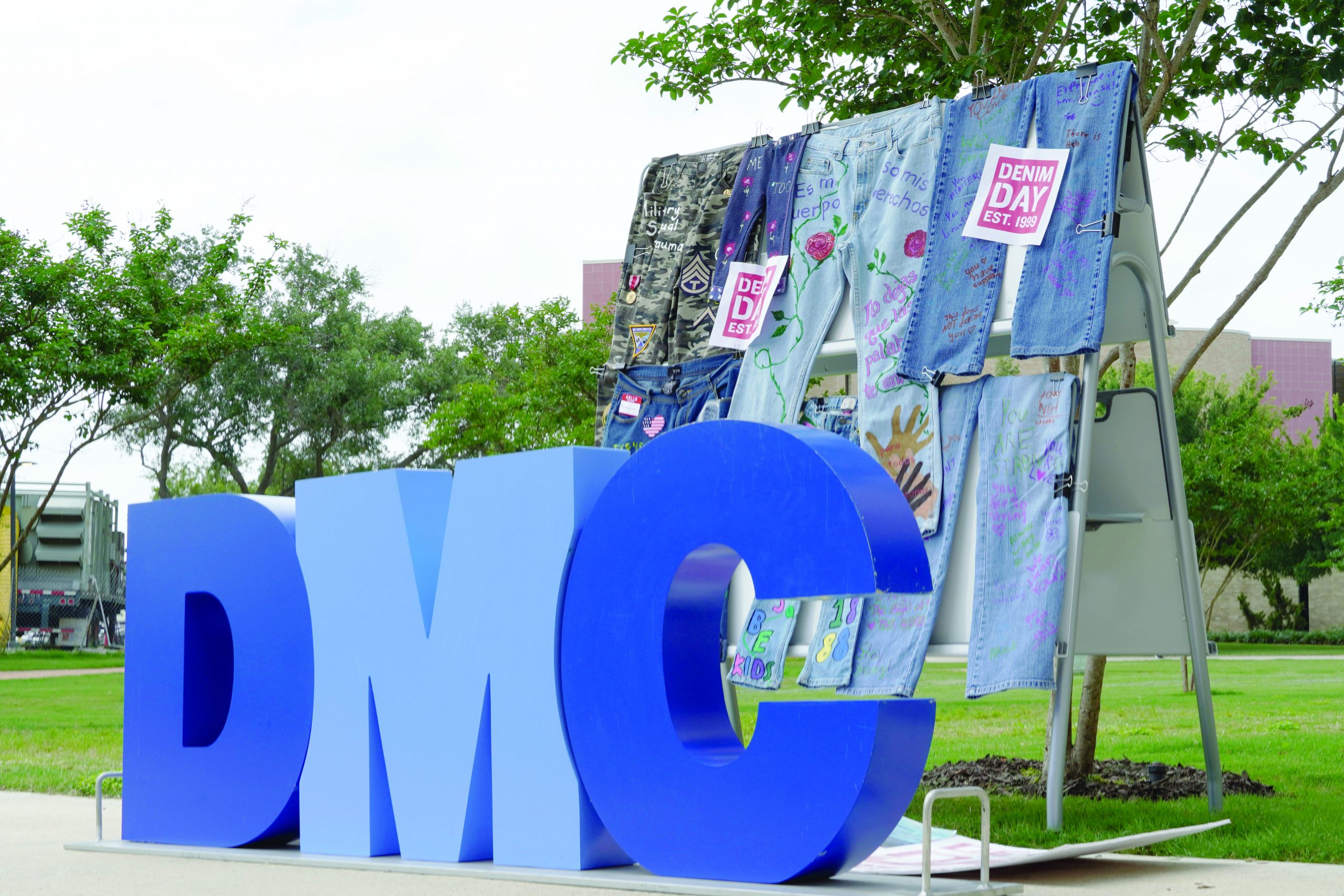
Haley Willams/ Chief Photographer
When you walk into the office of David Irving, DMC professor of Music, you can’t help but notice the autographed photos lining the walls. All are of well-known jazz musicians and Irving is seen playing alongside those artists in most of the photos.
Artists include Lou Marini, better known as Blue Lou, of the Blues Brothers, Dizzy Gillespie, commonly referred to as one of the greatest trumpeters of the 20th century, and Lee Konitz, an American jazz composer and saxophonist.
Since he began teaching at DMC in 1972, Irving has brought these artists and many more to play concerts with Del Mar’s Monday-Wednesday-Friday (MWF) Jazz Band.
Irving began playing the guitar at four after receiving a tenor guitar, a guitar the size of a ukulele, from his aunt when he was three. Irving’s older sister, who also worked at DMC, taught herself to play but Irving didn’t understand it as well. “She played it for about a year and one day I picked it up and started playing too” Irving said.
“I never thought much about the career part of it when I was little,” Irving said, “but I always knew that the music was a part of me.”
In junior high, high school and college, Irving learned and played the French Horn. “Even though I was playing horn a lot, I always considered myself really a guitar player. Back in those days, if you wanted to be in the school band you couldn’t play the guitar.”
He said that not being able to play the guitar in the school band did not slow down his passion for the guitar. “Like most people who want to play music, I started a few of my own bands. Of course, they never went anywhere.”
After graduating from Miller High School, Irving earned his bachelor’s and master’s degrees in classical music at then-North Texas State College (now University of North Texas – UNT). His primary instrument of study was again, the French Horn.
Irving started his career in 1963 in the small town of Mart, Texas as the band director and also started the first jazz band there. “I always liked jazz, and when I was teaching in Mart, my second year, I thought it would be nice to have another way to keep my students for an hour a day and teach them everything I want to teach them,” Irving said.
Irving said he knew jazz, but never thought much about teaching it. “During the first six weeks, I got a beginning jazz band method book for everybody there and I would read a day ahead of them [the students] and teach them that lesson.” The jazz band must have learned a lot from Irving because in its first year the band placed at the then-prestigious Brownwood Stage Festival.
Irving came to Del Mar in 1972 and said that since then the campus has evolved to the student’s advantage. “I remember thinking back in those days, walking around the campus, and it just really did seem like a collection of buildings” Irving said. “I thought it would be really nice to have a pretty campus like they do at some of the other colleges I’ve seen. It’s gotten a whole lot better since 1972.”
In 1985, Irving got word from another jazz band director friend that the Montreaux Switzerland Tourist Bureau was taking ensemble directors from colleges to Switzerland to see about performing there. Irving and his wife went there in February of 1985 with about 20 other college ensemble directors.
“They showed us where we would perform, and the hotels where we would stay. The thing that sold it for me I think was when somebody put a Swiss chocolate and a Swiss army knife on our pillows at the hotel and I thought ‘I would really like to come back here,’” Irving said.
After returning, knowing he wanted to go back to Switzerland, Irving and his Monday-Wednesday-Friday (MWF) band, the biggest band he directed, had to raise almost $40,000 so the band could make the trip. “We spent pretty much every waking moment raising money, from the middle of September until he middle of July” Irving said.
The band put on numerous shows for fundraisers around town. “The community really got behind us,” Irving said. “Everybody wanted to be a part of it. Everyone involved worked very hard. Raising the money was almost as much fun as going on the trip.”
According to Irving, raising money was an unexpected benefit for the band. “We played so much that by the time we made the trip the band was on cruise control,” Irving said.
Today, and since 1977, Irving is the advisor over the fraternity Phi Mu Alpha Sinfonia, which was initiated into the Gamma Theta Chapter during his college years at UNT. “I enjoyed my collegiate experience so much that I just wanted to make sure that other generations of young men have the same opportunity,” Irving said.
In 1990, the advisor for the music sorority, Phi Sigma, resigned, leaving the position open. Irving volunteered as a temporary advisor, thinking a woman would be a better advisor for a sorority, but no one would do it.
“I volunteered because I wanted to keep the sorority going. As the father of a daughter I like to see young women have the same opportunities as young men do,” Irving said. “I think I stopped thinking it was a temporary duty a long time ago.”
The year after he volunteered for the advisor position of Phi Sigma, every current member left, either graduating or moving to different schools. “There was not one Phi Sigma on campus. I already volunteered to do the job and I wasn’t about to let it go” Irving said.
Irving began his recruitment for sisters with a pizza party. He invited anyone who would like to be a part of the sorority to come and meet with him. After the pizza party, Irving had 10 probationary members to work with.
According to Irving, all 10 members made it through. “Sororities and fraternities, not everyone gets all the way through. Sometimes they’re just not motivated enough, some have problems showing up, but these young ladies were really good probationary members, and I am close to some of them still to this day,” Irving said.
Having never worked with a sorority, Irving had trouble finding ways to initiate the probationary members. He went through files to piece together an initiation ceremony and initiated the women himself.
“After the second semester they had to decide what to do with me, because now they were Phi Sigmas and I wasn’t; I was just their advisor,” Irving said. “They had to make a decision to make me an honorary member or kill me, and I’m happy that they chose the former rather than the latter.” He said some of his Phi Sigma alumni call him “Mister Sister” to this day.
Irving presently advises three jazz ensembles on campus: the Jazz Combo, the Jazz Guitar Ensemble and the MWF Band. He also teaches two sections of “Rock and Roll History” and one Beginning Guitar Class and he said he can not choose a favorite to teach. “Pretty much pick one,” Irving said. “I can hardly wait to get here in the morning.”
Irving’s MWF Band will be the first band playing at the Jazz Festival Friday, Oct. 21 beginning at 5:45 p.m. at Heritage Park. “The Jazz festival is three days of great jazz and it’s absolutely free,” Irving said.





